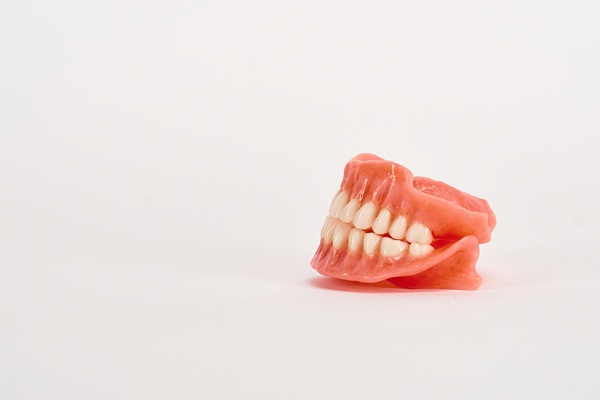Visit the Dentist if You Have Symptoms Associated With Ill-Fitting Dentures

Using
dentures to replace missing teeth have been a long standing tool in the arsenal of dentists everywhere. The ability to replace teeth, and thereby influence a person’s quality of life is a powerful ability.
Dentures come in two distinct forms, each of which has its uses and particular set of circumstances that must be met to get them installed. The first are partial
dentures. These are used in conjunction with your existing natural teeth to replace any teeth that you may have lost. You must have naturally occurring teeth that are strong enough to work with in order to use them. The other option is full
dentures, which are a complete set of replacement teeth that take the place of your existing natural teeth.Under normal circumstances, dentures rarely cause any problems with the mouth. There are a few minor infections that are associated with denture wear, which we will discuss later on. For the most part, however, dentures are a relatively uncomplicated affair. The two areas, that you should always be aware of when getting dentures, is the maintenance that is required for them and their fit. The fit is something, we will ensure, is right before you ever leave the dentist’s office. Ill-fitting dentures can cause all kinds of challenges and be extremely uncomfortable. Once you leave you will need to take good care of your dentures with regards to cleaning them, inserting them, and storing them.Here are two conditions that are often associated with denture wearing. If you notice any of these symptoms, it could be a sign of an improper fit, leading you to need a dental exam.
- Stomatitis: Stomatitis is a very general term, often used for an inflamed or sore mouth. Generally speaking, stomatitis can occur anywhere in or around the mouth, including the inside of the cheeks, the tongue, the lips, and even the palate. The two common forms of stomatitis are canker sores and cold sores. With regard to dentures, stomatitis is caused by mouth irritation that leads to inflammation and a sore mouth. Ensuring that the dentures fit properly and also making sure to take extra care, so as to not scrape the mouth, when inserting and removing the dentures can help with this problem. If the problem persists for a notable period of time, it may be time to see your dentist.
- Angular Cheilitis: Angular Cheilitis is often referred to as split lip because the corners of the mouth will split if you have this condition. Cracked corner lips, that do not heal, may be a sign that you have Angular Cheilitis, and should consider visiting the dentist. A mild case of this condition can lead to cracked lips, soreness, and some flaky skin around the corners of the mouth. As it gets more severe, however, Angular Cheilitis can cause an open wound, and the discomfort will reach levels that restrict eating and speaking. There are a number of causes for Angular Cheilitis, most commonly the excessive drooling sometimes associated with dentures. However, other factors like an infection may also be at work, which is why it is important if you have cracked mouth corners that will not heal, to visit the dentist immediately.
If your dentures are not fitting correctly there are a variety of challenges that you may deal with unnecessarily. Even if you have had your dentures for some time, your jaw may change shape, causing your dentures to become loose. We can help you to get the perfect fit so call today to schedule your appointment.
Root Canal Dentist > Cosmetic DentistryRecent Posts
Partial dentures are one of the most cost-friendly and effective options for replacing missing teeth. They can either be removable or fixed dentures. This is a guide on what partial dentures are, their benefits, and how to care for them.Partial dentures, commonly known as partials, are artificial replacement teeth that replace a patient's missing teeth.…
When you begin wearing dentures, you may experience discomfort for a short period while you are adjusting. However, this process does not have to be complicated. There are many ways to make the adjustment more manageable and more enjoyable.Here are three reasons you can easily get through the first few weeks of wearing dentures.If you…
Removable artificial teeth are called dentures. They replace permanent teeth lost or extracted due to damage or extensive decay. False teeth are a traditional dental restoration method that has been around for centuries and is still effective today. However, there are things you need to know about them before you start wearing them.Your dentist can…
Many people get dentures because they believe that missing a tooth is not appealing from a cosmetic standpoint. Missing teeth can also be detrimental to your oral health. This is why dentures are necessary to replace teeth, among other options. The dentist will go through the various alternatives with you. Regardless, you should always try…
 Using
Using 
